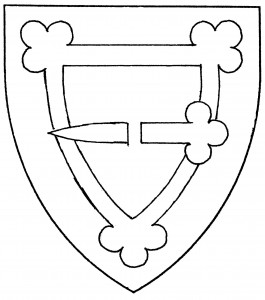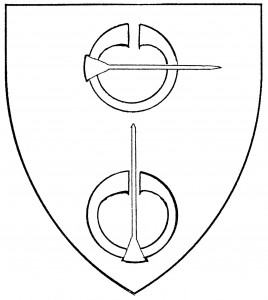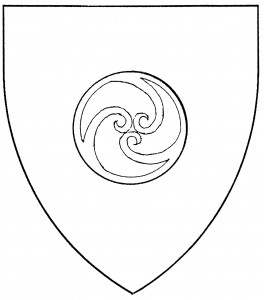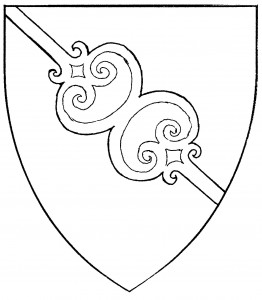A brooch is an item of jewelry, a large ornamental pin or clasp. In period armory, it’s frequently depicted with the pin piercing the field as though it were fabric. A common type, blazoned as a “closed brooch”, is basically shaped as an escutcheon; it’s found c.1370, and again in 1605, in the arms of von Zedlitz [Gelre 53v, Siebmacher 71]. If another type is intended, the shape should be specified, as with the “closed lozenge brooch” in the arms of von Wallenrodt, 1605 [Siebmacher 104], or the “ring brooch”.
Of the brooches unique to Society armory, the most common is the “penannular brooch”: a semi-circle of metal, with a sliding pin. The penannular brooch has its opening to chief by Society default. It may be found “closed”, with the pin overlying the brooch, or “open”, with the pin through the gap; closed is the default.
Other brooches have been blazoned by their general description: e.g., the “Celtic triquetrum brooch”, a description of the metalwork’s design; or the “Moorish hair-brooch”, an adornment for the hair. These brooch variants are no longer permitted in Society heraldry, being insufficiently documented.
For related charges, see buckle, torque.
The Order of the Silver Brooch, of the East, bears: A closed brooch argent.
Johann Wolfgang von Aue bears: Per pale sable and gules, three closed lozenge brooches Or.
Debrangal Greyheart bears: Ermine, an open penannular brooch inverted Or, a mount vert.
Widsith Devona of Exmoor bears: Per bend sinister azure and vert, a bend sinister argent, in chief a Celtic triquetrum brooch Or.
Alysse of Graedon bears: Azure, a Moorish hair-brooch bendwise throughout argent.



